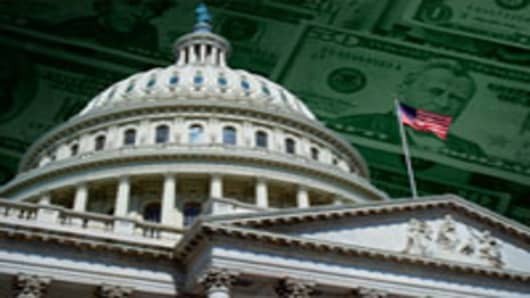#3 - The House Republicans May Just Say No. To raise the debt ceiling (without invoking the 14th Amendment as discussed below), the House Republican leadership and a sufficient number of House Republicans need to support a bill to raise the debt ceiling. If the House Republicans remain steadfast to their "cut, cap and balance" plan, which is a real possibility, then the debt ceiling will not get raised. And, Speaker of the House Boehner needs to play a careful game. While he may want to agree to a compromise, he will need to gain the full support of his Republican constituency before striking a deal. Without a majority of the House Republicans behind him, he may not be Speaker for too much longer.
#4 - Failing to Raise the Debt Ceiling May Be Good for President Obama's Re-Election Chances. Today, we are living with the “Obama Economy”. Despite the stimulus packages and other spending, the unemployment rate is at 9.2%, underemployment is at 18.3% and the economy grew at a tepid 1.8% in the second quarter of 2011. All signals are that the economy will not grow significantly before the 2012 elections and unemployment will remain stubbornly high. In the debt ceiling debate, President Obama is calling for significant spending cuts, but he wants to couple those cuts with tax reform. He has argued that it is fair to increase taxes on private jet owners and hedge fund managers. If the House Republicans hold their breath and vote against the raising of the debt ceiling, President Obama may be able to change the label from the “Obama Economy” to the “House Republican Economy”. This could make his campaign easier and focus economic blame on the Republicans.
#5 - President Obama May Not Invoke the 14th Amendment. Bill Clinton has said he would use the 14th Amendment "without hesitation" to raise the debt ceiling. Section 4 of the 14th Amendment states that "the validity of the public debt of the United States . . . shall not be questioned." President Clinton's position is that voting to raise the debt ceiling is not to keep increasing deficit spending but to raise the money necessary to pay for obligations already incurred. According to the Bipartisan Policy Center's "Debt Limit Analysis," if the debt ceiling is not raised, then on August 3rd, the United States will be $20 billion in the hole. Specifically, on August 3rd, the United States brings in $12 billion of revenues and owes $32 billion, including $23 billion of social security payments. However, despite President Clinton's arguments, many Congressional Republicans disagree, and it is uncertain whether President Obama would take the political risk of raising the debt ceiling without a bi-partisan deal.
As the debt ceiling negotiations play out over the next week and a half, the ideological differences may prove to be too much for a deal to be reached. The Treasury and the Fed are focused on contingency plans and the markets are watching closely. As the negotiations are complex and a deal will require much thought and discussion, we may be at the point where we have run out of time.
Jon Henes is a partner in the restructuring group at Kirkland & Ellis LLP where he has led some of the most complex restructurings in the United States and abroad across a variety of industries, including media, chemicals, energy, manufacturing, real estate, retail and telecommunications. Jon has also frequently appeared on CNBC's "Worldwide Exchange" as a guest expert on various financial and economic topics, federal, state and local fiscal issues.


